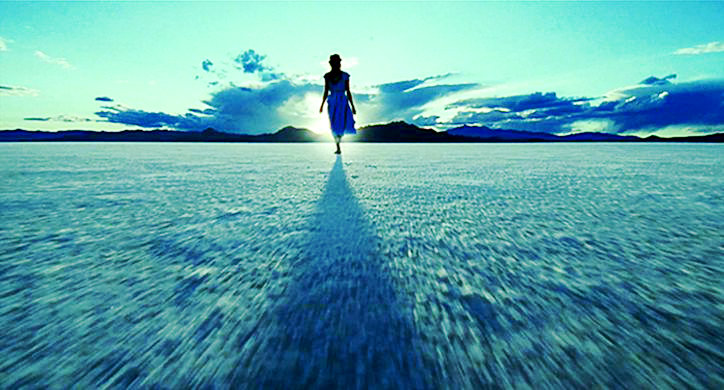
Father. Mother. Brother. Sisters. Still we climb through life, reaching for sunlight, searching for grace. Dog. Always you whine in the morning, the primal urges of nature bursting forth within you. Do you also seek grace? Do you also seek forgiveness? Dinosaur. Why do you not eat that other dinosaur? If mercy fills your reptile heart, then why does it not fill mine? And Father: Why must you bounce the ball against my head? Is this struggle also the way of nature?
So unfolds Terence Malick’s beautiful but flawed The Tree of Life, a perhaps-overly meditative disquisition on life, the universe, and growing up poor and rough in Waco, Texas. Malick, as I am sure you all know, is the type of director who inspires passion on both sides of the fence, from devotion (See Matt Zoller Seitz’s video essays on Malick’s first four films) to antipathy. To quote a grad school friend of mine, Malick’s movies are “[l]ong, long streams of annoying non sequiturs delivered by impassive yet chiseled actors staring into the distance. (Well, sure! That’s a feature, not a bug!)
At any rate, this is a Malick movie through and through, so if his penchant for philosophical ponderings via voiceover and fall-of-Eden metaphors irritate you, you’ll probably want to take a pass here. I myself am closer to the Seitz end of the spectrum: While I still have only seen it once, I adored The New World, and it clocked in at #4 for my Best of the 2000’s list. The Tree of Life, unfortunately, is a stickier wicket, and it didn’t really resonate with me like World did. It is undeniably beautiful, and I definitely admire its ambition. But, for all its cosmic scope and archetypal language — Father, Mother, and whatnot, this really ends up being an intensely personal and idiosyncratic story about growing up in 1950’s Texas, and that is a story I never found to be all that engaging.
The Tree of Life opens with a quote from the Book of Job (suggesting at first that Malick has moved beyond his Eden obsession — no, that shows up later), and, after introducing us to a suburban family in Texas, some Job-like news for them to digest. One of the sons seen playing in the sun in the opening moments has, apparently, died in Vietnam several years later, leaving their saintly mother (Jessica Chastain) and take-no-guff father (Brad Pitt) bereft. Also in mourning is the deceased’s brother Jack, who we come to know mostly as a child (Hunter McCracken, the spitting image of The Thin Red Line‘s Jim Caviezel) bu also as an adult (Sean Penn), where he works as an architect in some unnamed urban purgatory.
The film’s bravura sequence occurs early, as adult-Jack is momentarily distracted from his ennui and notices what seems to be the titular tree, and, lo, we suddenly flash back to the dawn of Creation. Over the next ten minutes or so, light separates from dark, stars coalesce amid the galactic dust, and, eventually, an earth is born — home to volcanoes and great oceans, as well as amoebae, jellyfish, dinosaurs, hammerheads, and eventually, disconsolate Texans. Even if the often-amazing Hubble 3D stole some of Malick’s thunder here, this section of the movie is often breathtaking to behold. If anything, it should have been longer. Where are the early mammals? The cro-magnons and neanderthals?
Oh, wait, they’re in the Lone Star State, in the form of Brad Pitt — a stern, unyielding dad who is always testing his children, trying to make them hard. (There’s that Job angle again.) And so, once we return to the mid-20th century, Jack must grow up wrestling with his conflicted feelings for his father — why is he so unjust? why does he make me pull out weeds by the roots and re-enact Fight Club? — while also worrying about disappointing his child-like and loving mother. (Of course he does eventually, which is where we get to that ubiquitous fall from Eden, with later flashes of Cain and Abel to boot.)
Unfortunately, all these sun-dappled and vaguely biblical Texas days of Jack’s yore, while still pretty to look at, weren’t particularly involving to me, and they comprise the bulk of the film. Honestly, how did we get from witnessing the formation of galaxies to reliving The Great Santini or This Boy’s Life? I think I get what Malick was trying to do here, but, to me, the move from the cosmic to the specific didn’t really work.
The moments when Jack is still a baby or, say, when he first develops a crush are totally absorbing, because then it feels like Malick is still operating on a grand scale, evoking fundamental and universal human experiences. But, once our main character grows old enough to become his own individual, the circumstances of his plight stopped being resonant. I’m sorry Jack’s dad is kind of a jerk, and I’m sorry Jack feels bad about blowing up a frog. But I’m not particularly interested by these developments either.
Don’t get me wrong. I’m glad I saw Tree of Life. It looks ravishing at times, and I admire its reaching for the stars. But its reach exceeds it grasp — or at the very least it exceeded my attention span the longer it dwelled in rural Texas — and I have to confess to being more than a little bored by it over the course of its last hour. Father. Mother. Judge me not for losing interest. It is in my nature, and I cannot fight what I am.

